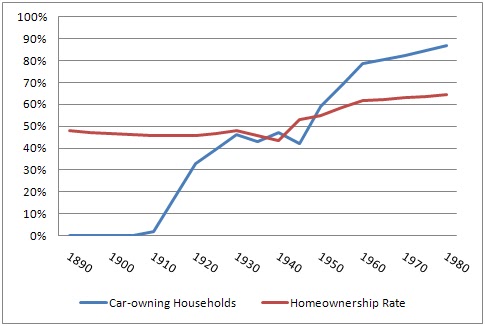Crime Correlation
Gun ownership. Crime. Economy. Police forces. Race. So many things intertwine together when trying to look at crime rates that it gets confusing and difficult to tell what is causing what to change, and what is being influenced by something else.
So what do we know about the various factors I have mentioned so far? Well, violent crime hit a peak in the early 1990's (rate is per 100,000 people):

Property crime rates, however, peaked earlier in the early 1980's, remaining fairly stable for about a decade:

What lead to such a rise in crime rates though? Well, as I pointed out earlier, there are numerous intertwined factors. Like the prevalence of leaded gasoline, which had ties to violent behavior in people, and car ownership, which increased consumption of said gas, both of which rose after WW2.

Of course, leaded gas can't be attributed alone as the cause of increased crime in the US, though the time it was being phased out (1976-1991) correlates with the plateau we see in US crime rates in general.
Edit: it should be noted that a lead heavy environment is very consistent with violent crime rates.
There are other factors, of course, such as the economy. How does that correlate with general crime?

As we can see, personal expenditure has been rather stagnant for several decades, though it has been on a slow increase since the mid 1980's. What's interesting is how that personal expenditure compares to the US GDP over time:
So personal expenditure was stagnant while the GDP was on the rise. And what about employment rates?

Go figure, there's some correlation with the crime rates there as well.
Now, something that gun nuts have been touting to me lately is that crime is down while gun ownership is up. The logic they seem to be putting forth is that we're safer when there's more guns, because less people commit crimes when more people have guns. I know, I know, stop those eyes from rolling for a bit. Let's put that argument to the test. If we look at crime rates and gun ownership rates, then we should be seeing higher crime during periods of low gun ownership, and vice versa:

Well, that's a little odd. Turns out that the highest gun ownership rate correlates perfectly with the peak of crime rates. And that the ownership rate is actually way down from that point. Yes, it's gone back up recently (which I attribute to people freaking out about guns being taken away and reactions to our terrorism culture), but it seems that when gun ownership falls, so does crime rates. Or vice versa. It's hard to say which caused which to drop.
So how about law enforcement? What role does that play in our web of cause/effect categories?
Funnily enough, that's a chart I'm having troubles finding, as when I search for a chart showing the number of sworn officers over time, I end up trying to sift through a wall of charts showing on duty police deaths over time (interesting note here, the highest was during prohibition). But we do know that in the 90's, there was an influx of cops across the nation, thanks in part to Clinton. And that does correlate with both a drop in crime rates, and a massive increase in incarceration rates.
So perhaps that's the cause that resulted in lower crime rates. Or maybe it's not. With so many things that correlate so intricately, it's hard to really pinpoint the exact reason crime rates rose and fell, and there are so many I haven't even touched, like the race aspect, or plea bargaining, or the war on drugs (which also saw an increase in police death), or specific economic policies. If anybody would like to try tackling that, be my guest. I'm just a foolish young person looking at charts and seeing patterns.


Comments
It's lead
The phasing out of tetraethyl lead at different times in multiple national and international jurisdictions fits crime drops better than anything else. The number of natural experiments that back this finding is quite high.
We can’t save the world by playing by the rules, because the rules have to be changed.
- Greta Thunberg
Now that is a great article
one I should probably link in my essay.
Edit: and now it is.